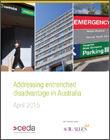On 21 April 2015, CEDA released a policy perspective examining issues associated with the economics of disadvantage.
<
Despite Australia's low unemployment rate and record levels of workforce participation, there are a significant number of communities in Australia experiencing entrenched disadvantage.
In this policy perspective, CEDA examines issues associated with the economics of disadvantage, such as:
- The nature and extent of disadvantage;
- The cost and dynamics of disadvantage; and
- New ways to address entrenched disadvantage.
This policy perspective was released on 21 April 2015.
 Download the report - Addressing entrenched disadvantage in Australia
Download the report - Addressing entrenched disadvantage in Australia
Read the media release - CEDA report: More than a million Aussies living in poverty a disgrace
Read opinion piece -Australia must do more to address entrenched disadvantage
Read CEDA blog - Early intervention key to addressing disadvantage: Dr Lisa O'Brien
Chapters and authors
Chapter one: Poverty and social disadvantage: Measurement, evidence and action
Professor Peter Saunders, Research Chair in Social Policy, Social Policy Research Centre, UNSW
Chapter two: Persistent disadvantage: A duration analysis based on HILDA data
Dr Francisco Azpitarte, Ronald Henderson Research Fellow, Melbourne Institute/Brotherhood of St Laurence and Dr Eve Bodsworth, Research and Policy Manager, In and Out of Work, Brotherhood of St Laurence
Chapter three: Early intervention: The key to preventing entrenched disadvantage
Anne Hampshire, Head of Research and Advocacy, The Smith Family
Chapter four: Entrenched disadvantage in Indigenous communities
Dr Nicholas Biddle, Fellow, Centre for Aboriginal Economic Policy Research, Australia National University
Chapter five: Living with mental illness
Professor Lorna Moxham, Leader, Living Well, Longer – Global Challenges Program and Professor of Mental Health Nursing, University of Wollongong
Supported by CEDA member:
